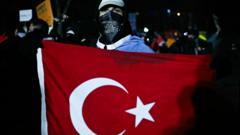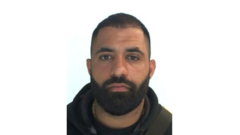As protests in Turkey enter their sixth day, opposition leader Ekrem Imamoglu's recent detention has ignited public dissent and raised questions about the future of democracy in the country.
Protests Escalate in Turkey as President Erdogan Blames Opposition for Unrest

Protests Escalate in Turkey as President Erdogan Blames Opposition for Unrest
Widespread demonstrations in Turkey persist as President Erdogan points fingers at opposition leaders for inciting violence and chaos.
In Istanbul, significant unrest began last week following the arrest of Mayor Ekrem Imamoglu on corruption charges, which many view as politically motivated. Despite President Recep Tayyip Erdogan's statements blaming the opposition for inciting violence, protests have continued without escalating into previous violent clashes. Demonstrators are calling for a restoration of democratic principles and demanding the release of political prisoners.
Imamoglu, a prominent figure in the opposition and recently announced candidate for the 2028 presidential election, has been charged with several offenses, including extortion and corruption. Critics argue that these charges are part of a broader effort to undermine opposition movements. The protests, primarily led by disillusioned youth, have highlighted a wider dissatisfaction with Erdogan's rule, which has lasted over two decades.
The main opposition party, the Republican People's Party (CHP), stated that demonstrations would pause on Tuesday, while Erdogan branded the unrest as an "evil" movement. Demonstrators have characterized the government's response to protests as oppressive, with reports of authorities using water cannons and pepper spray against protesters.
Imamoglu's situation is particularly precarious; if convicted, he would be barred from running for president, which would significantly alter the political landscape in Turkey as the next election approaches. As tensions remain high, many citizens express a desire for change, rallying against what they perceive as an authoritarian regime. The CHP continues to advocate for democracy in Turkey while calling for the release of Imamoglu and other political detainees.
Public sentiment appears to be shifting, as protesters demand accountability not only from the government but also expect improvements from opposition leaders. With Erdogan's term scheduled to end in 2028, the possible constitution changes or early elections loom over the political climate, leaving many hopeful yet uncertain about Turkey's future direction amidst ongoing protests.
Imamoglu, a prominent figure in the opposition and recently announced candidate for the 2028 presidential election, has been charged with several offenses, including extortion and corruption. Critics argue that these charges are part of a broader effort to undermine opposition movements. The protests, primarily led by disillusioned youth, have highlighted a wider dissatisfaction with Erdogan's rule, which has lasted over two decades.
The main opposition party, the Republican People's Party (CHP), stated that demonstrations would pause on Tuesday, while Erdogan branded the unrest as an "evil" movement. Demonstrators have characterized the government's response to protests as oppressive, with reports of authorities using water cannons and pepper spray against protesters.
Imamoglu's situation is particularly precarious; if convicted, he would be barred from running for president, which would significantly alter the political landscape in Turkey as the next election approaches. As tensions remain high, many citizens express a desire for change, rallying against what they perceive as an authoritarian regime. The CHP continues to advocate for democracy in Turkey while calling for the release of Imamoglu and other political detainees.
Public sentiment appears to be shifting, as protesters demand accountability not only from the government but also expect improvements from opposition leaders. With Erdogan's term scheduled to end in 2028, the possible constitution changes or early elections loom over the political climate, leaving many hopeful yet uncertain about Turkey's future direction amidst ongoing protests.




















